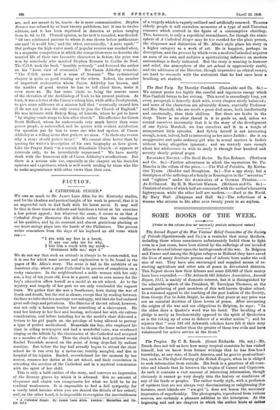FICTION.
A CA1HEDRAL SINGER.* WE owe so much to Mr. James Lane Allen for his Kentucky studies, and for the idealism and poetical insight of his work in general, that it is an ungrateful task to find fault with his latest novel. It may well be that in these times so delicate and fastidious a talent as his exercises a leas potent appeal ; but whatever the cause, it seems to us that A Cathedral Singer illustrates the defects rather than the excellences of his qualities, and by its constant and almost gratuitous plucking at our heart-strings playa into the hands of the Philistines. The present writer remembers from the days of his boyhood an old verse which ran ;— " I sits with my feet in a brook, If any one asks me for why, I hits him a crack with my crook- ' Sentiment kills me,' says L" We do not say that such an attitude is always to be comm ended, but it is one for which some excuse and explanation is to be found in the pages of Mr. Allen's story. The scene is laid in the outskirts of an American city, where a great Cathedral is in process of completion on a rocky eminence. In the neighbourhood a noble woman with her only son, a boy of ten years old, lives in a garret, and to earn money for the boy's education offers herself as a model at an art school. As to the mystery and tragedy of her past we are only vouchsafed the vaguest hints. We gather that she was a Southerner, born during the war of North and South, but the rest is silence, except that by reading between the lines we infer that her marriage was unhappy, and that she had endured great sufferings and privations. The Director of the art school, however, was not only a famous teacher but something of a clairvoyant. He read her history in her face and bearing, welcomed her with chi valrous consideration, and before installing her in the model's chair delivered a lecture to his girl pupils on the privilege of being allowed to portray a type of perfect motherhood. Meanwhile the boy, who employed his time in selling newspapers and had a wonderful voice, was overheard singing on the hillside by the choirmaster of the Cathedral and accepted as a member of the choir. Thus the clouds which had gathered round Rachel Truesdale seemed on the point of being dispelled by radiant sunshine. But before the boy had actually begun to attend the choir school he is run over by a motor-car, terribly mangled, and dies in hospital of his injuries. Rachel, overwhelmed for the moment by her sorrow, resumes her duties at the art school, and finds consolation in attending the services of the Cathedral and in a mystical communion with the spirit of her child.
This is only a bald outline of the story, and conveys no impression of the literary graces by which it is adorned. But no amount of eloquence and charm can compensate for what we hold to be its cardinal weaknesses. It is impossible to feel a full sympathy for a sorely tried heroine when you are denied the details of her ordeal; and, on the other hand, it is impossible to recognize the inevitableness
• A Cathedral Singer. By James Lane Allen. London : Macmillan and Co. ps. net.]
of a tragedy which is vaguely outlined and artificially renewed. To some elderly people it will reawaken memories of a type of mid-Victorian romance which centred in the figure of a consumptive choirboy. This, however, is only a superficial resemblance, for though the atmo- sphere of A Cathedral Singer may be too rarefied for the plain person, the eloquence and distinction of Mr. Allen's style place his story in a higher category as a work of art. He is happiest, perhaps. in description, and the process by which even a modern Cathedral acquires an aura of its own and radiates a spiritualizing influence on modern surroundings is finely indicated. But the story is wanting in humour and relief, the atmosphere of the art school is oppressively exalte. and the addresses of the Director, though impressive as ethical essays, are hard to reconcile with the statement that he had once been a headlong art student.


























 Previous page
Previous page